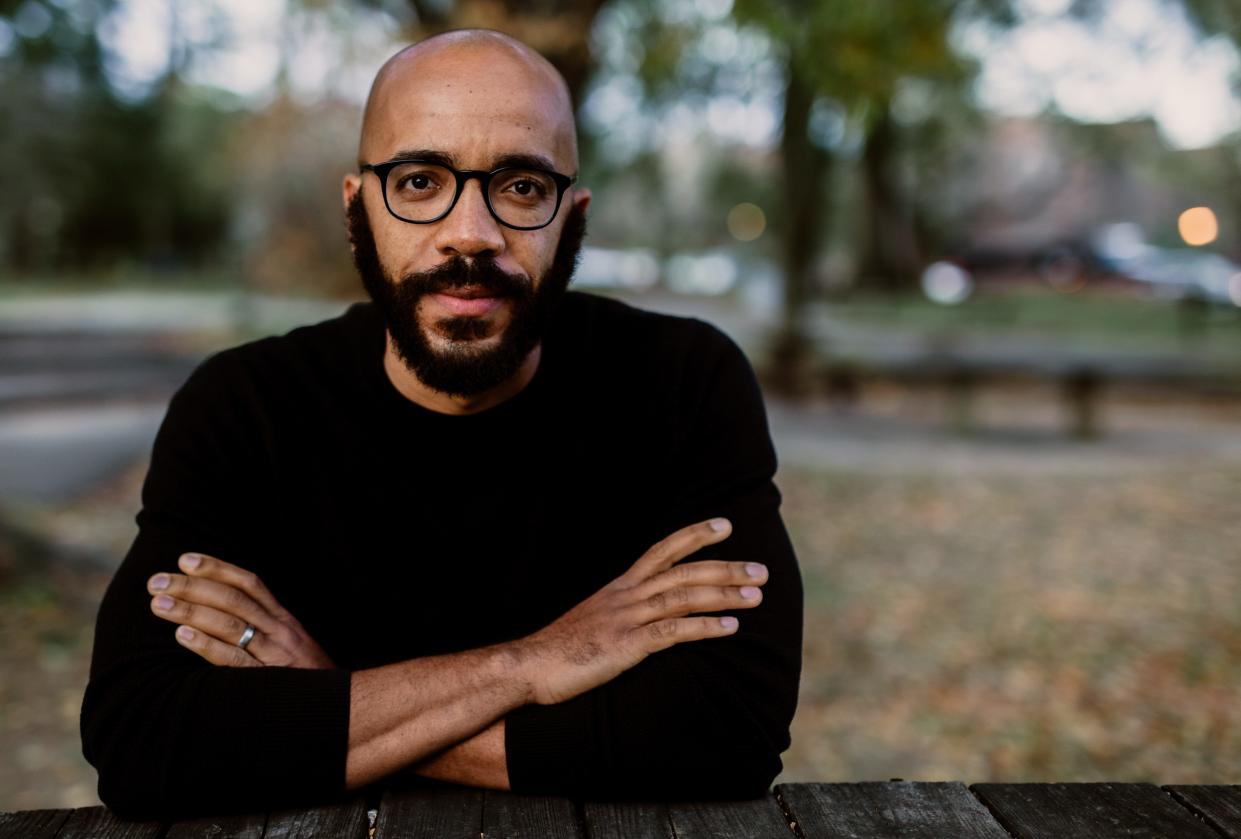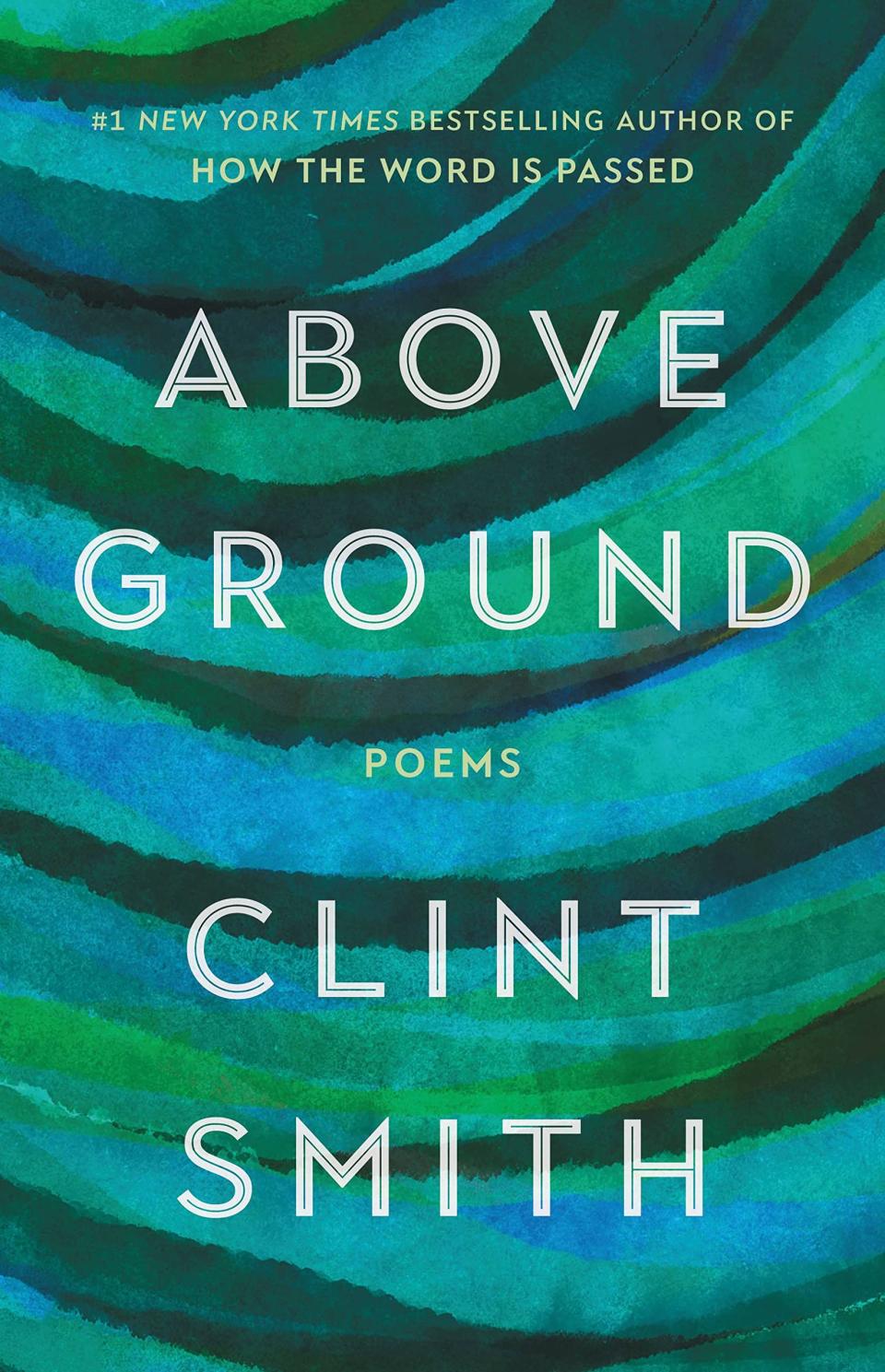Fatherhood helped Clint Smith lean into 'levity' and 'silliness' in poetry collection 'Above Ground'

Becoming a father has made Clint Smith "lean into levity."
Purchases you make through our links may earn us and our publishing partners a commission.
The poet and author of the 2021 book "How the Word Is Passed: A Reckoning With the History of Slavery Across America," which received the National Book Critics Circle Award for nonfiction, and his recently published poetry collection "Above Ground" (Little, Brown and Company, 128 pp., out now), has learned from fatherhood to not take himself so seriously.
In his second poetry collection, the staff writer at The Atlantic pens odes to an electric baby swing ("I literally cannot imagine my life without you") and to the infant hiccup ("You are adorable until you wake up the sleeping child"), and of watching in wonder as his two children experience the world for the first time.
"Being a parent has made me a sillier person," Smith tells USA TODAY. "I loved being able to laugh at my poems and laugh at my writing in a way that I wasn't really able to do in my previous book because it was about such a difficult and heavy subject matter."
But he also writes of the complexities and anxieties of being a Black parent in a country plagued by "social, political catastrophe and ecological devastation." His poems interrogate lineage and slavery, and some are addressed to his children to teach them about what their ancestors endured and escaped to make their life possible.
At its core, "Above Ground," Smith says, is about how "we hold the simultaneity of the love you have for your family and your friends amid the larger cycle of despair that we so often live through."
Smith spoke to USA TODAY about the process of writing the second collection, teaching his kids about their family history, gun violence and why "poetry is the act of paying attention." (The interview has been condensed and edited for clarity.)
"Above Ground" for $24.30 at Amazon
"Above Ground" for $25.11 at Bookshop

Question: How was the process of writing "Above Ground"?
Clint Smith: When I began these poems, this was at a moment where my wife had gotten pregnant with our son, and it was a very uncertain and fragile and precarious pregnancy. It was uncertain if we would even conceive, the doctors told us we had less than a 1% chance. So I really wanted to document, capture and archive these moments of how I was feeling and then after my children were born, and these moments of watching them grow from these embryos to these babies, to these toddlers, to these little humans – and trying to use poetry as a means of excavating, reflecting and meditating on these small, everyday moments with your family. I'm interested in the simultaneity of the human experience, and how we hold joy, despair and wonder alongside fear, anxiety and insecurity.
Clint Smith's first book: Author reckons with America's racial history in necessary 'How the Word Is Passed'
Q: Your poems depict anxieties and fears of not just being a parent, but specifically what it means to be a Black father. What have you learned about that experience and how has it influenced this collection?
Smith: I think about how life is only possible and how my children's lives are only possible because of generations of people who fought for something they knew they might never see, but who fought for it anyway because they knew someday someone would. These daily moments I share with my kids, the dance parties we have in the kitchen making French toast Sunday mornings, watching episodes of "Peppa Pig," going to the park and swinging back and forth on the swing – those moments are only possible because of those generations of people who struggled to make this possible for me. I think all the time about what sort of responsibility that bestows upon me and bestows upon my own children. I want my children to understand the history from which they come, the history that shapes the world we live in today.
Want the real truth about slavery? Try these books, movies for kids, adults and teachers
I want them to have an acute understanding of that, and obviously you talk about it in a way that's developmentally appropriate. I talk to my kids about slavery; I talk to my kids about segregation; we talk about colonialism; we talk about all of it. I also want them to know that that is a part of their history, but that doesn't represent the totality of their history (and) that the possibilities of their lives are only limited by their imaginations. That's reflected in the libraries they have, too.
They have the little kid books about Martin Luther King Jr., Coretta Scott King, Frederick Douglass, and Harriet Tubman, and they also have books about the little Black girl who wants to be an engineer and the little Black boy who wants to be a scientist – again, that reflects the simultaneity and the necessity of holding multiple realities at once. So as a Black parent, how do my kids hold the history and understand the history from which they come but also recognize what lies before them is endless and limitless?
Amanda Gorman's debut poetry collection 'Call Us What We Carry' inspires fellow WriteGirls
Q: In the poems "Counting Descent II," "By Chance" and "It's All in Your Head," you write about medical staff not listening to your wife during her pregnancy, and how "doctors said that we had less than a one percent chance" of conceiving. How was that experience and writing about this from a male perspective?
Smith: I love my wife more than anything, and to see the person you love in pain and suffering, and to see the person you love having what they're saying so blatantly disregarded, is incredibly difficult. That feeling is only compounded when the stakes are not only for your wife but for your unborn children, so it was infuriating. I feel very lucky to have a partner who insisted on people listening to what she was saying and ensuring she got the attention she needed at that moment. She had a condition called cholestasis, and if she hadn't insisted on getting a different doctor or getting the tests that she needed, my children could have died in utero and something deadly could have possibly happened to her.
More: In 'persistent' trend, Black fetal deaths are twice as high as white deaths, CDC finds
That is reflective of what especially Black women go through all the time. We have all of these stories about Black women who nearly died or did die during pregnancy because the larger medical establishment doesn't take seriously their pain and what they're saying about their own bodies. That felt really important to chronicle. And it's been written about from the perspective of someone who is experiencing it directly, but it also felt important to write about from the perspective of a partner of one of those people and the sense of hopelessness that I felt because of it.
Q: On social media, you shared your poem "The Gun" and wrote you disliked how relevant and timely it was due to recent shootings. As a writer, sometimes the goal is to create timely art, but when we're dealing with the timeliness of the horrific aspects of society – how do you feel about it then?
Smith: There are poems in my collection about gun violence that I wrote years ago because this is an incident that has happened and continues to happen and unfortunately, will likely continue to happen. Because we fail to do anything meaningful about it. I feel grateful when I have work that is helpful to people in processing a moment, processing grief and processing tragedy. I feel very grateful to have work that can be a part of that process for people, and at the same time, I'm devastated by the fact that we continue to mourn the same thing over and over again. I don't want that poem to be relevant.
I have a poem, “The Gun,” published in @TheAtlantic today from my new book.
Hate how relevant it is. Hate how timely it continues to be. Hate how we could do something to stop this from happening, but continue not to.https://t.co/oHTX7yXZBG pic.twitter.com/c1N27AxZJF— Clint Smith (@ClintSmithIII) March 29, 2023
Ideally, I want that poem to be something that people look at and say, like, "Wow, I can't imagine what it was like to live through an era in which school shootings felt ubiquitous and just felt like at any moment a kid could be shot in their classroom."
I want people to read that poem and think of it as an archive of the past. But instead, it just continues to be read as a reflection of the present. That's a real shame.
"Above Ground" for $24.30 at Amazon
"Above Ground" for $25.11 at Bookshop
100 days into 2023, Louisville attack marks nation's 146th mass shooting and 15th mass killing
From the 2021-22 school year: Shots fired in U.S. schools spiked dramatically last year, gun violence report finds
This article originally appeared on USA TODAY: Clint Smith: 'Above Ground' author on poetry, fatherhood, slavery


